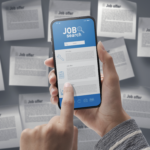How can HR professionals stay ahead of the curve and adapt to the latest developments across the employment field? Having a perspective on how to prepare for changes is key to cultivating success, as explored by ITN Business in ‘The Future of Work: People, Culture and Tech’ — Zoe Smith, ITN Business
Just like the world at large, the world of work shifts and changes over time, something that has never been more prescient than since the global COVID pandemic.
Business leaders and HR managers now find themselves at the forefront of organisational transformation, with unprecedented challenges and opportunities demanding a proactive and strategic approach.
From adapting to a new digital landscape — where AI, automation and remote collaboration will increasingly reshape traditional roles — to fostering a culture of continuous learning; to prioritising employee mental health and work-life balance, there are many ways leaders can create a supportive environment in the workplace, to cultivate success, centred around values of diversity, inclusion, equality, and a sense of purpose.
As well as addressing changing technologies and wellbeing, HR managers must navigate the challenges posed by a remote and hybrid workforce — which plays into talent acquisition, performance management, and communication strategies. A more geographically dispersed workforce is driving a re-evaluation of traditional HR practices, placing sharper focus on advanced communication tools, robust performance metrics, and a positive company culture.
Recruiting and retaining talent is set to become another key challenge for businesses as we move through 2024, with experts predicting that companies will start seeing 50 to 75% higher turnover rates, as frustrations and workplace stress grows among employees.
Poor mental health and ‘burn-out’ is a major issue in the UK, with one in five people reported to have taken time off work in the last year due to pressure and work-related stress. A new report by Mental Health UK reveals that 9 in 10 adults have experienced high or extreme levels of pressure or stress in the last year, with a third saying they felt uncomfortable voicing their concerns.
To explore the many challenges and opportunities facing the world of work, ITN Business will be showcasing how professionals can stay across changing trends and adapt to the latest developments across the employment field in the news-style programme, ‘The Future of Work: People, Culture and Tech’.
Launching in June 2024, the digital programme will be presented by the internationally renowned broadcaster and journalist Duncan Golestani, as we endeavour to further understand the evolving workplace landscape.
ITN Business has partnered with the CIPD, the Scale-Up Institute and the Institute for the Future of Work, to produce the programme and bring audiences reporter-led case study films exploring a range of emerging trends.
From how people policies can adapt to innovative tech; to how workplace safety laws are adapting; to what is required to build a positive, inclusive company culture; and the role development programmes can play in setting organisations up for success, the themes explored in ‘The Future of Work’ are the workplace trends every leader needs to be across.
Key themes of the programme
Embracing technology and AI
Automation and tech can support various aspects of HR, finance and payments, to performance management and employee engagement. Increasingly, management will adopt AI-powered tools and chatbots to streamline administrative tasks, enhance data analytics capabilities, and provide personalised experiences.
Data-driven decision making will support professionals to gain insights into supporting their employees and their performance, workflow and retention. Predictive analytics and project management tools also will play a significant role in planning.
Employee wellbeing
With the rise in mental health issues, and work-related stress, employee wellbeing has become a top priority for organisations and this trend will continue to grow in importance. HR departments will play a crucial role in designing and implementing comprehensive wellbeing programmes that address physical, financial, mental, and emotional health. From flexible work arrangements, benefits and mental health support to wellness initiatives and work-life balance policies, organisations will continue to strive to create a positive and supportive work environment.
Remote and hybrid working
The COVID-19 pandemic accelerated the adoption of remote work, and the hybrid approach is now here to stay. Our professionals will need to navigate the challenges of managing remote teams, fostering collaboration, and ensuring employee engagement in virtual environments.
Learning and professional development
With the rapid pace of technological advancements, continuous learning will be crucial for organisations to stay competitive. Management should promote agile learning methodologies, such as microlearning and personalised development plans, to ensure employees have the necessary skills to adapt to evolving job requirements. Collaboration with learning technology providers and the integration of AI-driven techniques will become common practices.
Recruitment and retention
Companies face huge challenges around attracting top-tier talent and retaining their existing skilled professionals. As competition intensifies, businesses will be compelled to reevaluate and elevate their recruitment strategies, while prioritising employee engagement, career development, and a supportive workplace culture.
This programme is the second in the ‘Future of Work’ series, with last year’s programme taking a deep dive into how the pandemic was a catalyst for change, and the increasing role of AI in business. It was supported by a special podcast episode, featuring experts from the Institute for the Future of Work, Microsoft UK, and the London Business School.
ITN Business’ upcoming programme offers HR leaders unique insights into the changing landscape of work, providing opportunities for leading organisations to share their most important work and core values, with the chance to spearhead their own news item.
It has never been more critical for leaders and HR professionals to understand what the future of work might look like, whether in an SME, a start-up or a multinational business, HR professionals are key changemakers in any organisation.
Having a perspective on how workforces and workplaces can prepare for changes that are inevitable, will enable HR leaders and their teams to cultivate success.
About ITN Business
Through human-led storytelling, which has been at the heart of ITN’s wider capability for decades, ITN Business amplifies the voices of key opinion leaders and organisations to drive greater impact. Our content shows positive work in action, challenges perceptions and builds a wider understanding of issues from across the world of business, supporting organisations to reach the audiences that matter to them.
ITN Business’ new content hub provides a content and insights destination targeting global business leaders, CEOs and policy makers, bringing together hundreds of hours of award-winning content.
Future of Work: People, Culture and Tech will have a dedicated programme page on the hub, featuring individual films from the programme, alongside partner logos, and the full linear programme. The programme will launch with a comprehensive digital marketing campaign in partnership with The Economist and the HR Director.
If your organisation wants to share what you stand for and be part of this important conversation, please contact ITN Business’ Programming Directors Charlotte Lenman at Charlotte.Lenman@itn.co.uk or James Salver at James.Salver@itn.co.uk.









